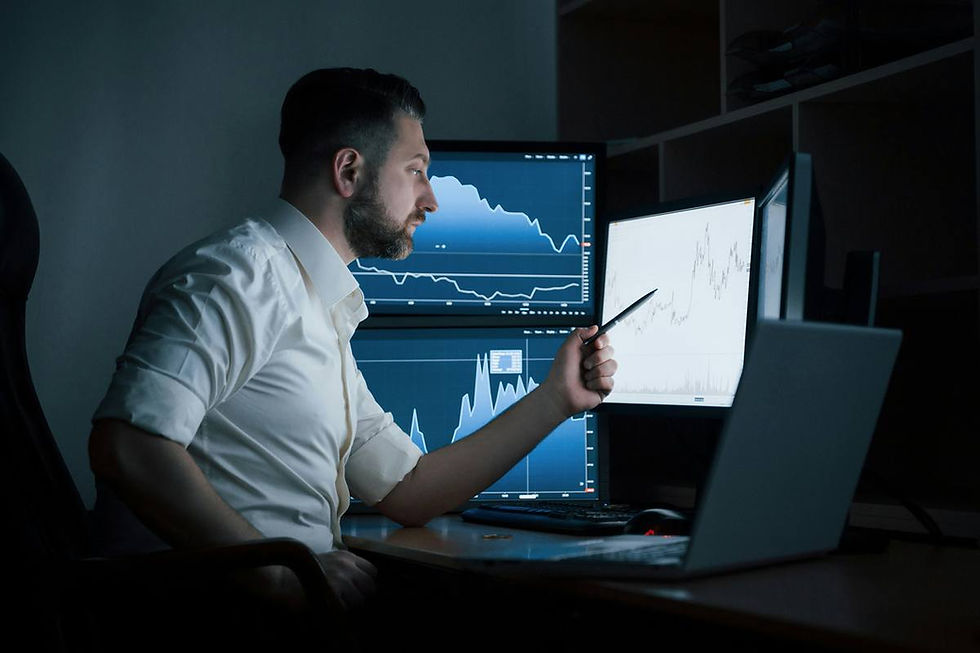Institutional Trading: Elevating Standards in Global Markets
- John Lowry Spartan Capital

- Nov 21, 2024
- 3 min read
Institutional trading plays a pivotal role in shaping global financial markets. Through the participation of entities such as hedge funds, mutual funds, and pension funds, these large-scale transactions inject liquidity and stability into the marketplace. Leveraging advanced technologies and strategies, institutional trading enhances efficiency while minimizing risks. By adhering to stringent regulatory standards, it fosters transparency and investor confidence, setting benchmarks for ethical practices. As markets evolve, institutional trading continues to lead innovation, drive economic growth, and offer valuable insights into market dynamics. Its impact extends beyond profits, contributing to the integrity and resilience of the global financial ecosystem.
These professionals leverage extensive resources and innovative technologies to stay ahead of the curve. Their ability to execute trades precisely and adapt to changing conditions underscores their pivotal role in global financial ecosystems.
Advanced Technology as the Foundation
Technology is the cornerstone of institutional trading, enabling high-speed transactions and unparalleled accuracy. Sophisticated trading systems utilize real-time analytics and artificial intelligence to evaluate market trends and execute trades efficiently. These technological advancements provide institutional traders with a competitive edge, ensuring their decisions are data-driven and timely.
Additionally, automated systems streamline operations, reducing the risk of human error and enhancing scalability. As the integration of blockchain and machine learning continues, the future of institutional trading promises even greater levels of precision and innovation.
Mitigating Risks Through Strategic Planning
Strategic planning is a vital tool for mitigating risks in any organization or project. By identifying potential challenges early, teams can implement proactive measures to minimize their impact. A well-crafted strategy involves thorough risk assessment, prioritization of issues, and the creation of contingency plans to ensure business continuity. Effective communication and collaboration among stakeholders are essential to anticipate uncertainties and address them efficiently. Additionally, leveraging data and predictive analytics enhances decision-making, reducing vulnerabilities. With strategic planning, organizations not only safeguard their operations but also build resilience, positioning themselves for long-term success in an unpredictable environment.
Furthermore, these traders employ predictive models and scenario analysis to anticipate potential disruptions. By addressing risks proactively, institutional trading firms maintain resilience and adaptability, even in uncertain markets.
The Role of Expertise in Dynamic Markets
While technology enhances trading efficiency, human expertise remains an indispensable element of institutional trading. Experienced professionals interpret complex data, react to unexpected developments, and devise strategies that machines cannot replicate. This blend of human insight and technology is what enables institutional traders to excel in dynamic environments.
Collaboration among trading teams fosters innovation, as diverse perspectives lead to well-rounded decision-making. Together, human expertise and cutting-edge tools create a synergy that defines institutional trading’s success.
Driving Liquidity and Market Stability
Institutional trading significantly enhances market liquidity, ensuring that assets can be bought or sold with minimal impact on their prices. Large-scale trades executed by institutional firms infuse much-needed capital into markets, benefiting all participants. Liquidity creation is a hallmark of institutional trading’s influence on global markets.
In addition, institutional trading reduces market volatility by stabilizing prices during periods of high activity. This stabilizing effect fosters confidence among investors and supports the broader financial ecosystem, making institutional trading indispensable to market health.
Adapting to an Evolving Regulatory Landscape
In today’s fast-paced world, businesses face constant regulatory changes that demand agility and foresight. Compliance with new laws requires organizations to stay informed, implement proactive strategies, and embrace innovative solutions. From environmental regulations to data privacy laws, adapting involves cultivating a culture of accountability and continuous learning. Leveraging technology, such as compliance management systems, helps streamline processes and reduce risks. Effective communication and collaboration between teams are essential to ensure seamless adaptation. By prioritizing adaptability, businesses can navigate complexities, maintain compliance, and thrive in an ever-changing regulatory landscape, turning challenges into opportunities for sustainable growth and success.
Institutions invest heavily in systems that monitor and enforce rule adherence, reducing the risk of penalties and reputational damage. By prioritizing compliance, institutional traders reinforce their commitment to accountability and sustainability in financial markets.
Shaping the Future of Institutional Trading
The landscape of institutional trading is continuously evolving, driven by emerging technologies and shifting market demands. Innovations such as decentralized finance (DeFi) and quantum computing are expected to redefine how trades are executed and secured. These emerging trends promise further to enhance the efficiency and scope of institutional trading.
Moreover, the increasing focus on environmental, social, and governance (ESG) factors is reshaping investment strategies. Institutional traders are aligning their practices with these principles, reflecting a commitment to responsible and sustainable growth. This forward-looking approach ensures their relevance in an ever-changing financial world.
Institutional trading represents the pinnacle of expertise, technology, and strategic foresight. By consistently delivering exceptional results, it remains a cornerstone of the global financial markets, setting new standards for performance and innovation.






Comments